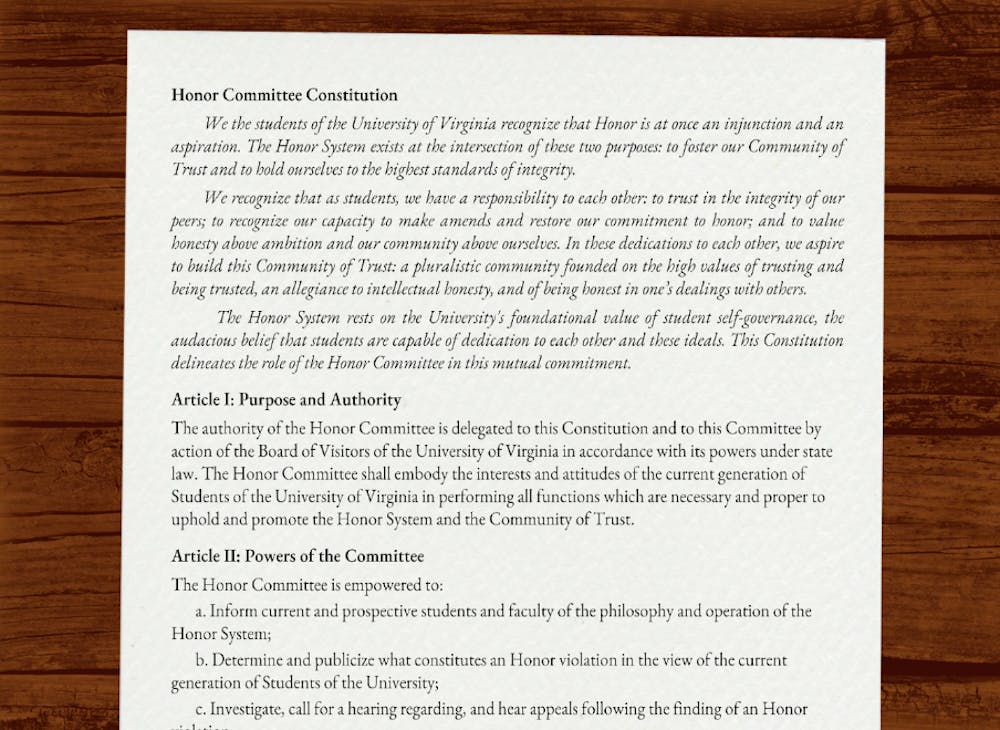This week, we ask you to join us in delivering on a historic and necessary evolution for our Community of Trust — a multi-sanction Honor system.
The student body sent a clear message last spring — we are ready for reform. Amid concerns about disproportionate and inequitable sanctioning, students voted to modify the single sanction to mitigate the harm of a one size fits all model and lay the groundwork for more fundamental changes. With last year’s vote, we demanded that the Honor Committee work to implement comprehensive reforms that would create a fairer and more equitable Honor system for all students.
The Committee has heard you loud and clear. We all want a system that is fair and restorative, with sanctions that reflect the severity of an Honor offense and the circumstances of the student in question.
We believe that we have delivered on this demand. This new constitution recognizes the power of education and amends in the Community of Trust and fosters a system that fairly treats first generation and low-income students, graduate students, international students and student athletes.
You can find the full text of the constitution and a summary of all of the changes on our website, which includes other reforms like increased representative accountability mechanisms, but the following three points are the most significant changes regarding the system.
1. A new Panel for Sanction will administer sanctions that match the severity of the offense and circumstances of the student
Currently, when an Honor case goes to a hearing, the hearing panel’s decision on guilt determines whether an accused student will be subject to the only sanction available — a two-semester leave of absence.
The proposed Constitution changes this process. Each Panel for Guilt will consist of seven randomly selected students from the student body and five Committee representatives. This 12 member panel, with a random student majority, will determine whether the accused student is guilty of committinged the alleged offense through an Honor hearing.
If the accused student is found guilty, a Panel for Sanction — consisting of the subset of the five Committee panelists — will take a number of factors into account when determining the appropriate sanction. Arguments for reasonable amends from the guilty student, the significance of the case to the Community of trust and arguments presented by the Counsel will all be taken into account, for example. This panel will also consider the advice of the random student panelists who sat on the Panel for Guilt, the evidence and all other aggravating and mitigating circumstances. The Panel for Sanction will conduct a holistic assessment before administering an appropriate and equitable sanction.
The proposed constitution provides more flexibility in setting sanctions. Under the proposed language, the Panel for Sanction could impose sanctions including — but not limited to — amends, education, leaves of absence and expulsion. This allows for fairer sanctioning by taking the nature of the infraction into account. For example, not all offenses will merit a two-semester leave of absence, although some certainly could.
Any sanctions will require a fourth-fifths vote from the sanctioning panel. The panel must then provide the guilty student with a written decision explaining the rationale of any and all sanctions.
2. Expulsion’s return comes with significant, student controlled guardrails
While this new constitution would bring back expulsion as a possible sanction for an Honor offense, it comes with strong guardrails to prevent its inappropriate use. Many of these protections are new to the system.
First, if an accused student is found guilty, they will be able to present arguments to the sanctioning panel about what kind of sanction is most appropriate for their case.
Second, the sanctioning panel will be able to consider mitigating factors in determining sanctions.
Third, the random students on the Panel for Guilt can prevent the sanctioning panel from even considering expulsion as a possible sanction. If at least five-sevenths of the random student members of the Panel for Guilt vote that the offense isn’t severe enough to warrant expulsion, then the Panel for Sanction may not consider expulsion as a sanction.
Fourth, expulsion may not be used if a student properly submits an Informed Retraction — the Honor system’s mechanism by which a student admits guilt when reported for an alleged offense.
These are all important procedural safeguards to ensure expulsion is only utilized in the rare circumstances where it is truly necessary.
3. Taking accountability after a report recognizes and honors a student’s capacity to make amends
As previously mentioned, students reported for an Honor offense may file an IR — pleading guilty to the offenses alleged and agreeing to make amends with the Reporter and the Community of Trust by taking a two-semester leave of absence.
The proposed constitution removes this automatic two-semester suspension as the sanction imposed upon students who have demonstrated accountability for their misconduct. Instead, students who plead guilty will work with their reporter and a Panel for Sanction to agree upon appropriate sanctions that reflects the student’s recommitment to the Community of Trust.
This change not only honors a student’s capacity to make amends with adversely affected parties, but will also encourage University-wide buy-in to a system that recognizes our capacity to grow from mistakes and remain a member of the community.
Even though this proposal reflects the input of students across Grounds and is the product of an extensive, research-intensive process, we acknowledge it is just one step in the long journey ahead of rebuilding trust and regaining buy-in to our tradition of Honor. This is a step, however, that establishes a fairer and more equitable system for community members to hold each other accountable, while simultaneously fostering a restorative approach. If passed, this multi-sanction system will allow the Committee to better serve our Community of Trust.
We ask that you vote “yes” to bring this system to life. We ask that you vote “yes” for your fellow students, for your friends and for your communities. We ask that you vote “yes” for our Community of Trust.
The 2022-23 Honor Committee representatives voted to publish this piece at their Feb. 26, 2023, meeting. Questions may be directed to opinion@cavalierdaily.com.







